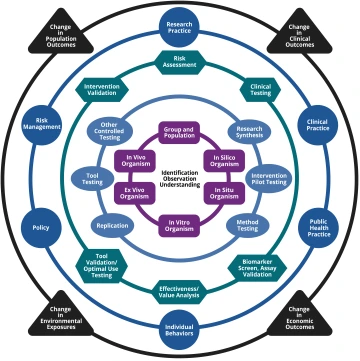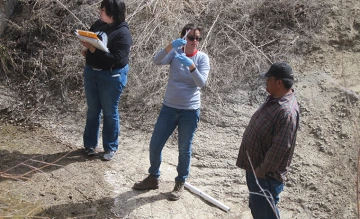
NIEHS translational framework
The IRTH leverages SWEHSC human studies and exposure assessment experts to provide a central resource for research consultation and support to investigators sampling Southwest human populations and their living environment. In addition, IRTH scientists assist environmental health science researchers to build translational collaborations from basic science to public health interventions. The goal of IRTH is to help support investigators across and around the rings of the NIEHS Translational Framework.
This provides SWEHSC investigators with:
- Strategies for community engagement to ensure community partner buy-in and participant recruitment.
- Scientific guidance and practical assistance with methodologies for exposure estimation and measurement. These include exposure modeling, GIS techniques, and sampling of environmental media (e.g. air, water, dust, soil) and human biomarkers.
- Experience in the implementation of community-engaged research, including consultation on internal and external regulatory requirements.
- Assistance with designing studies aimed at understanding biological mechanisms of findings from epidemiological studies and designing human studies to assess interventions aimed at reducing the impact of environmental exposures based on findings from mechanistic studies.
- Help in identifying collaborators to conduct translational environmental health research.

Further, IRTH helps identify important exposure concepts that promote an understanding of exposure science for use in the translation of results to the community by the SWEHSC Community Engagement Core. Mentoring and guidance on technical aspects of projects important to Southwestern underserved populations will build trust and technical skill capacity among community scientists and leaders and promote environmental health literacy among community members. The IRTH interacts directly with community members through training events, teach-ins, sampling consultations, identification of analytic laboratories, interpretation of data, and intervention development and implementation. In this regard, the resource is involved in building community capacity among diverse populations in the Southwest to reduce environmental health disparities.
The IRTH has developed a structured approach to providing assistance for projects receiving subsidized support, to ensure that the best delivery of support results in successful research outcomes.
Paloma Beamer, PhD
Resource Co-Director/Manager
Roy P. Drachman Hall A223
Office: 520-626-0006
Email Dr. Beamer
Zelieann Craig, PhD
Resource Co-Director
Bioscience Research Labs, 355
Office: 520-621-8082
Email Dr. Craig
